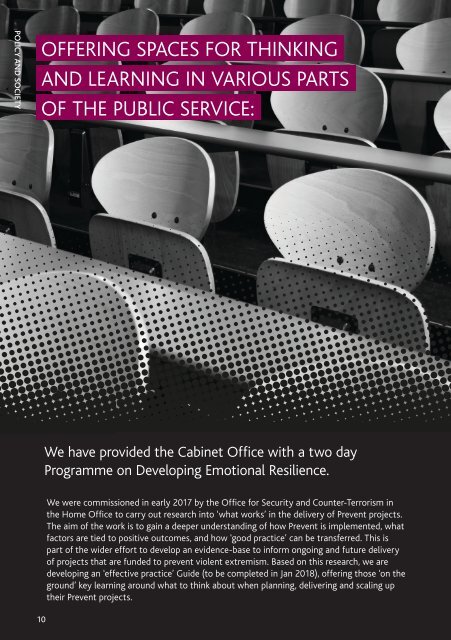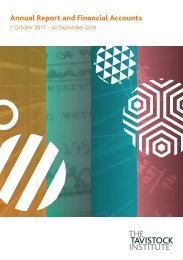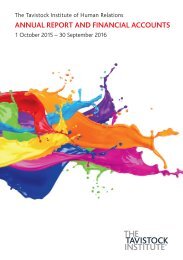Tavistock Institute of Human Relations Annual Report, 1st October 2016 - 30th September 2017.
This is the latest Tavistock Institute of Human Relations Annual Report! Covering from the 1st of October 2016, up to the 30th of September 2017.
This is the latest Tavistock Institute of Human Relations Annual Report! Covering from the 1st of October 2016, up to the 30th of September 2017.
Create successful ePaper yourself
Turn your PDF publications into a flip-book with our unique Google optimized e-Paper software.
POLICY AND SOCIETY<br />
OFFERING SPACES FOR THINKING<br />
AND LEARNING IN VARIOUS PARTS<br />
OF THE PUBLIC SERVICE:<br />
TIHR WORKS WITH<br />
MACMILLAN CANCER SUPPORT<br />
How to <strong>of</strong>fer better community based support and<br />
care to people living with and beyond cancer?<br />
POLICY AND SOCIETY<br />
There is a growing trend within the NHS and allied organisations to enable personal and effective<br />
community based support for people with long term conditions so that they can navigate their<br />
way beyond clinical care towards self-managed activities and resources. We have been working<br />
with Macmillan Cancer Support on several projects to extend personalised support and care to<br />
people living with, and beyond, cancer, including one project focused on the redesign <strong>of</strong> cancer<br />
pathways within the Imperial Healthcare Trust. Underpinning Macmillan’s work is the belief that<br />
by <strong>of</strong>fering a holistic needs assessment, people living with cancer will have a better quality <strong>of</strong><br />
life as many <strong>of</strong> their concerns may be addressed outside the clinical setting, for example, ‘who’s<br />
going to walk my dog?’.<br />
We have been supporting the development <strong>of</strong> a monitoring and evaluation framework for<br />
the Recovery Package to help understand the difference these innovations make, as well as<br />
evaluating projects and exploring system change and its effects on, for example partnership<br />
working. In its early stages, our input has already helped the development and implementation<br />
<strong>of</strong> Theory <strong>of</strong> Change in multiple locations and early feedback shows that working through coproduction<br />
leads to shared understanding about the role <strong>of</strong> evaluation in learning and change.<br />
At the core <strong>of</strong> our work with Macmillan is understanding the role <strong>of</strong> should read navigation,<br />
signposting and advocacy. We have also completed two evaluations <strong>of</strong> locality care navigation<br />
projects for people with long term conditions, for the National Association for Primary Care,<br />
with a further project directed at supporting service veterans via the Forces in Mind Trust.<br />
We have provided the Cabinet Office with a two day<br />
Programme on Developing Emotional Resilience.<br />
We were commissioned in early 2017 by the Office for Security and Counter-Terrorism in<br />
the Home Office to carry out research into ‘what works’ in the delivery <strong>of</strong> Prevent projects.<br />
The aim <strong>of</strong> the work is to gain a deeper understanding <strong>of</strong> how Prevent is implemented, what<br />
factors are tied to positive outcomes, and how ‘good practice’ can be transferred. This is<br />
part <strong>of</strong> the wider effort to develop an evidence-base to inform ongoing and future delivery<br />
<strong>of</strong> projects that are funded to prevent violent extremism. Based on this research, we are<br />
developing an ‘effective practice’ Guide (to be completed in Jan 2018), <strong>of</strong>fering those ‘on the<br />
ground’ key learning around what to think about when planning, delivering and scaling up<br />
their Prevent projects.<br />
10<br />
11














